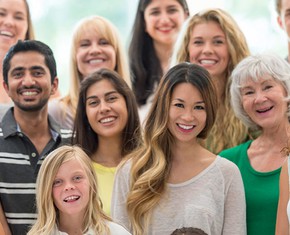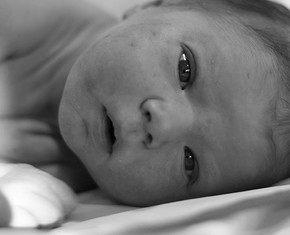The views expressed in our content reflect individual perspectives and do not represent the authoritative views of the Baha'i Faith.
Different levels of maturity require different ethics. Remember, as a child, when your greatest ethical challenge involved minding your mom by keeping your hand out of the cookie jar?
If we’re lucky as children, we grow up with an ethical framework that helps us do the right thing. Good parenting, moral guidance through spiritual training, an educational system that helps develop character and healthy peer influences can all contribute to that framework—but as we pass through the stages of life, the framework itself adapts and changes according to our individual stage of maturation. As we mature, so do our ethics—hopefully.
When that happens, our ethics determine our actions, and our collective actions create our overall conduct—what psychologists refer to as our personal pattern of behavior.
So let’s pause for a minute and ask ourselves: How’s my conduct been lately? Have I lived up to the moral and spiritual values I profess?
The Baha’i teachings, and the teachings of all global Faiths, ask each one of us to conduct ourselves in ways that would make our Creator proud:
O friends! Help ye the one true God, exalted be His glory, by your goodly deeds, by such conduct and character as shall be acceptable in His sight. He that seeketh to be a helper of God in this Day, let him close his eyes to whatever he may possess, and open them to the things of God. Let him cease to occupy himself with that which profiteth him, and concern himself with that which shall exalt the all-compelling name of the Almighty. – Baha’u’llah, Gleanings from the Writings of Baha’u’llah, p. 272.
Here’s the modern question: what is good? How do we define “goodly deeds”? In this age, when situational ethics and a fluid moral compass characterize much of human behavior, what kind of universal moral framework could possibly transcend and unify our different cultures and beliefs?
Baha’is believe that their Faith, brought by Baha’u’llah, represents the most recent revelation from the Creator—and brings a new, universal moral and spiritual system to humanity. That unique system, the Baha’i teachings say, has the potential to comprehensively unite the world’s divergent moral codes with a single ethical foundation:
… education is essential, and all standards of training and teaching throughout the world of mankind should be brought into conformity and agreement; a universal curriculum should be established, and the basis of ethics be the same. – Abdu’l-Baha, The Promulgation of Universal Peace, p. 181.
In order to make the basis of ethics the same everywhere, the Baha’i system of moral and spiritual ethics starts with a single, essential teaching for today—the oneness of the entire human race:
The time has arrived for the world of humanity to hoist the standard of the oneness of the human world, so that solidarity and unity may bind together all the nations of the world, so that dogmatic formulas and superstitions may end, so that the essential reality underlying all the religions founded by the Prophets may be revealed.
That reality is one.
It is the love of God, the progress of the world, the oneness of humanity.
That reality is the bond which can unite all the human race.
That reality is the attainment of the benefits of the most great peace, the discarding of warfare.
That reality is progressiveness, the undertaking of the colossal tasks in life, the oneness of public opinion.
Therefore strive, O ye people! and put forth your efforts, that this reality may overcome the lesser forces in life, that this king of reality may alone rule all humanity.
Thus may the world of mankind be reformed. Thus may a new springtime be ushered in and a fresh spirit may resuscitate mankind.
The individuals of humanity, like refreshed plants, will put forth leaves and blossoms and fruit, so that the face of the earth will become the long promised and delectable paradise, so that the great bestowal, the supreme virtues of man will glisten over the face of the earth. Then shall the world of existence have attained maturity. – Abdu’l-Baha, Star of the West, Volume 8, p. 97.
“That reality is progressiveness,” Abdu’l-Baha said. The son of Baha’u’llah and the leader of the Baha’i Faith after his passing, Abdu’l-Baha taught, just as Baha’u’llah did, that humankind could now, for the first time in our history, attain a collective state of maturity.
Like individuals, Abdu’l-Baha said, the whole human race also passes through progressive stages of development. At one time, in our collective infancy, we lived in caves and eked out a rudimentary, hand-to-mouth existence. Gradually, though, humanity passed through its collective childhood, gaining an education but also prone to conflict and violence. Now, the Baha’i teachings say, we have reached the point of our joint human passage from adolescence to adulthood:
The long ages of infancy and childhood, through which the human race had to pass, have receded into the background. Humanity is now experiencing the commotions invariably associated with the most turbulent stage of its evolution, the stage of adolescence, when the impetuosity of youth and its vehemence reach their climax, and must gradually be superseded by the calmness, the wisdom, and the maturity that characterize the stage of manhood. Then will the human race reach that stature of ripeness which will enable it to acquire all the powers and capacities upon which its ultimate development must depend. – Shoghi Effendi, The World Order of Baha’u’llah, p. 202.
The Baha’i teachings promise us that this beautiful vision of human ethical and moral maturity, the eternal dream of poets, philosophers and prophets, will come to pass—if and when we can embrace our inherent unity and oneness as a species.
Please follow along in this series of essays as we explore how that could happen.
















Comments
Sign in or create an account
Continue with Googleor